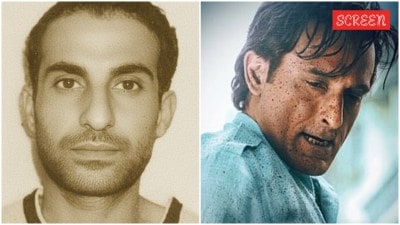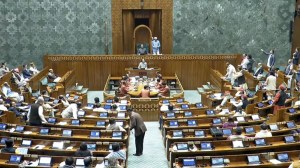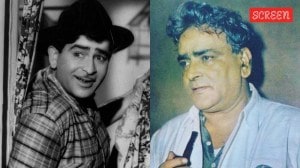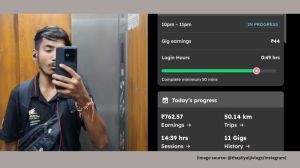Why HC sentenced popular YouTuber ‘Savukku’ Shankar to six months in jail
The HC had taken suo moto cognizance of Shankar’s statement during an interview with Youtube channel Red Pix on July 22, where he claimed that the “entire higher judiciary is plagued by corruption”.
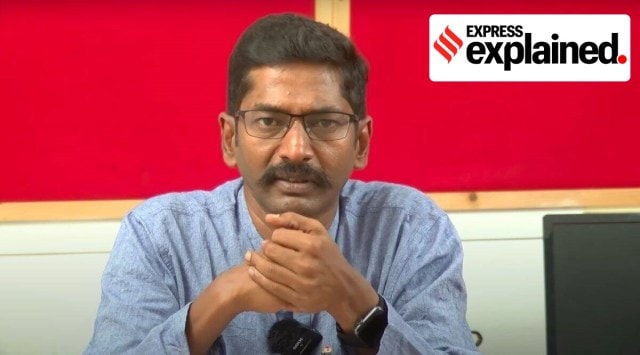 Savukku Shankar (Express)
Savukku Shankar (Express)The Madras High Court on Thursday (September 15) found activist and YouTuber A Shankar, popularly known as ‘Savukku’ Shankar, guilty of criminal contempt and sentenced him to six months’ imprisonment for his remarks about the higher judiciary.
The HC had taken suo moto cognizance of Shankar’s statement during an interview with Youtube channel Red Pix on July 22, where he claimed that the “entire higher judiciary is plagued by corruption”.
The bench of Justice G R Swaminathan and Justice B Pugalendhi stated, “He cannot tar the entire institution with a single brush. That would be crossing the lakshman rekha by a long shot. It is not as if the said remark accidentally tumbled out of his mouth.”
The judges said that Shankar’s statements were “scandalous” and that they “denigrate and deride the institution of judiciary.” Claiming that he did not express regret or offer any apology, the court refused to entertain his request for a suspended sentence until he files an appeal with the apex court, and directed that Shankar be immediately taken into custody and lodged in Madurai central prison.
What is criminal contempt, who can be found guilty of it?
According to the Contempt of Courts Act, 1971, contempt of court can either be civil contempt or criminal contempt. The former means wilful disobedience of any judgment, decree, direction, order, writ or other process of a court, or wilful breach of an undertaking given to a court.
Criminal contempt, on the other hand, means the publication (whether by words, spoken or written, or by signs, or by visible representations, or otherwise) of any matter or the doing of any other act whatsoever which
(i) scandalises or tends to scandalise, or lowers or tends to lower the authority of, any court; or
(ii) prejudices, or interferes or tends to interfere with, the due course of any judicial proceeding; or
(iii) interferes or tends to interfere with, or obstructs or tends to obstruct, the administration of justice in any other manner.
Contempt of court may be punished with simple imprisonment for a term which may extend to six months, or with a fine of maximum Rs 2,000, or with both, provided that the accused may be discharged or the punishment awarded may be remitted on apology being made to the satisfaction of the court.
Has Shankar faced legal action earlier?
Shankar, who was an employee of the Directorate of Vigilance and Anti-Corruption (DVAC), was suspended over 10 years ago after he was accused of releasing an audio tape of a DMK minister, which eventually led to the minister’s resignation. Shankar was arrested in 2008 by the DMK government of Tamil Nadu for his alleged role in the leak, but was released on bail soon after. In 2017, he was acquitted of all charges.
In 2010, Shankar started a website called savukku.net (suvakku means a whip), which published articles on alleged corruption charges against government employees, politicians, journalists and judges. His role as a ‘whistle-blower’ reportedly earned him the title of Tamil Nadu’s (WikiLeaks founder) Julian Assange by some bloggers from the region.
Shankar had been at the receiving end of the Madras HC’s ire in 2014 as well, when the court called for an immediate ban on his website, observing that the “vituperative site” had damaged the reputation of many judges, advocates, and IAS and IPS officers.
Shankar, however, continued to post online content, claiming to expose further corruption through proxy URLs in the name of a former Madras HC judge, Justice Cyril Thamarai Selvam, who ordered the site to be blocked.
Why were contempt charges framed against Shankar?
Justice Swaminathan, one of the judges who delivered the recent order, had issued another suo moto contempt proceedings against Shankar on July 19, for tweets he posted after the judge quashed charges against a right-wing YouTuber. Shankar had alleged in his tweets that Justice Swaminathan had “met someone” at a temple on the outskirts of Madurai before releasing Maridhas.
In Thursday’s order, the court referred to the tweet and stated that Shankar was “clearly suggesting that the outcome of the said case was influenced by the person whom one of us allegedly met,” and was thus questioning the judicial integrity of one of the judges.
The second contempt case was leveled against Shankar days after the first, over his statement from the July 22 interview, alleging corruption within the judiciary. When he had appeared before the bench on September 8, Shankar “asserted categorically that he stood by what he said,” stated the court order.
In an affidavit filed in response to the contempt petition, which was published on his website on September 15, Shankar noted that his statement was taken out of context from conversations that were “about several issues relating to the legal system”.
“None of these conversations are abusive or scandalising. They are well-meaning and very important conversations. I respectfully submit that the entire conversation needs to be looked at to see the context,” he added.
- 01
- 02
- 03
- 04
- 05


